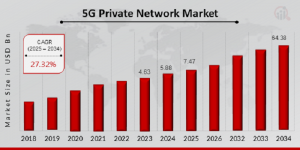5G Private Network Market Predicted to Hit 64.38 Billion by 2034
Rising demand for secure, efficient connectivity fuels 5G private network adoption, driven by AI, IoT, and OpenRAN innovation.
The 5G Private Network Market is emerging as one of the most significant developments in the field of telecommunications and network infrastructure. As the world increasingly moves towards digital transformation, businesses and industries are recognizing the need for more secure, faster, and more reliable networks to handle their growing data demands. 5G private networks offer organizations dedicated connectivity that is customized for their specific needs, ensuring higher levels of security, lower latency, and greater bandwidth compared to public 5G networks. These networks are tailored to enhance communication, streamline operations, and support mission-critical applications in various sectors such as manufacturing, healthcare, education, and logistics. With businesses becoming more reliant on data-intensive applications and IoT devices, 5G private networks are poised to revolutionize enterprise connectivity by providing more control, greater performance, and robust security.
Download Sample Pages: https://www.marketresearchfuture.com/sample_request/24549
Market Segmentation
The 5G Private Network Market is segmented based on several factors, including deployment type, component, application, end-user industry, and region. The market can be broadly classified into two deployment types: on-premises and cloud-based private networks. On-premises networks are hosted within the organization's facilities, offering more control and security. In contrast, cloud-based private networks are hosted on the cloud, offering greater flexibility and scalability. The components of a 5G private network typically include network infrastructure, hardware, software, and services, all of which work together to provide high-speed, low-latency communication. In terms of applications, industries such as manufacturing, logistics, healthcare, and energy are major adopters of 5G private networks due to their need for real-time data processing and secure communications. By end-user industry, key sectors driving the demand for these networks include manufacturing, retail, automotive, healthcare, and public safety, all of which require mission-critical communications and reliable, high-performance connectivity.
Market Key Players
The 5G private network ecosystem consists of various key players who are driving innovation and market growth. Prominent network equipment providers such as:
• Cisco Systems
• Nokia
• Samsung Electronics
• Fujitsu Limited
• Ericsson
• Dell Technologies
• Intel
• Oracle
• Huawei
• IBM
• NEC Corporation
• Hewlett Packard Enterprise
• Qualcomm Technologies
• ZTE
Browse In-depth Market Research Reports On 5G Private Network Market: https://www.marketresearchfuture.com/reports/5g-private-network-market-24549
Market Opportunities
The 5G Private Network Market presents significant growth opportunities as industries and enterprises look to capitalize on the benefits of 5G connectivity. One of the primary opportunities lies in the manufacturing sector, where private 5G networks are enabling the implementation of smart factories, enhancing automation, and improving production efficiency. By leveraging real-time data and analytics, manufacturers can streamline their operations, optimize resource utilization, and reduce downtime, driving productivity and profitability. The healthcare industry also stands to benefit greatly from 5G private networks, as they enable the deployment of telemedicine, remote patient monitoring, and other innovative healthcare applications. Moreover, sectors like logistics, retail, and automotive are also increasingly adopting private 5G networks to enhance operations, improve customer experiences, and facilitate autonomous vehicle technology. Another opportunity lies in the ability of 5G private networks to support critical applications in industries such as energy, public safety, and smart cities, offering enhanced connectivity and security for infrastructure monitoring and emergency response. The growing adoption of IoT devices, the need for ultra-low latency communication, and the shift towards digitalization across various sectors all contribute to the increasing demand for 5G private networks, creating an abundant market opportunity for businesses in this space.
Restraints and Challenges
Despite the promising growth, the 5G Private Network Market faces several challenges that may impede its widespread adoption. One of the key restraints is the high initial cost of implementing 5G private networks, particularly for small and medium-sized enterprises (SMEs). The infrastructure requirements, including the purchase of equipment and the deployment of dedicated spectrum, can result in substantial upfront costs. Additionally, the complexity of integrating 5G private networks into existing IT and network infrastructure poses a challenge for many organizations. This requires significant expertise in network management and cybersecurity, which can add to operational costs. Furthermore, the regulatory landscape surrounding the deployment of private 5G networks is still evolving, with many regions yet to define clear regulations regarding spectrum allocation, security standards, and operational guidelines. In some countries, regulatory hurdles may delay the rollout of 5G private networks, limiting market growth. Finally, the lack of skilled professionals with expertise in 5G technology and network management can hinder the efficient implementation and operation of these networks.
Procure Complete Research Report Now: https://www.marketresearchfuture.com/checkout?currency=one_user-USD&report_id=24549
Regional Analysis
The demand for 5G private networks varies significantly across regions, influenced by factors such as the level of digital infrastructure, regulatory policies, and industry adoption rates. North America leads the global market, driven by the presence of major telecom operators, high technological adoption, and early investments in 5G infrastructure. The U.S., in particular, has seen significant interest in 5G private networks from industries like manufacturing, healthcare, and logistics. Europe also holds a substantial market share, with countries like Germany, the UK, and France actively investing in 5G networks and related technologies. The Asia-Pacific region is expected to experience the highest growth rate due to the rapid digitalization of industries in countries like China, Japan, and India. These nations are investing heavily in smart cities, autonomous vehicles, and industrial IoT, all of which drive the need for 5G private networks. The Middle East and Africa are gradually emerging as key markets for 5G private networks, with regional governments focusing on smart infrastructure projects and the digitization of industries.
Recent Developments
In recent years, several significant developments have shaped the 5G Private Network Market. Major telecom companies and network equipment providers have been actively partnering with industries to create tailored 5G solutions. For instance, partnerships between telecom operators and manufacturers are resulting in the deployment of private 5G networks to power smart factory operations and industrial automation. Moreover, several companies have introduced new 5G private network solutions aimed at enhancing security, scalability, and ease of deployment. In addition to hardware providers, cloud giants such as AWS and Microsoft have expanded their offerings to include private 5G network services, offering enterprises cloud-based solutions to manage their dedicated networks. The market has also seen the deployment of private 5G networks for large-scale industrial and enterprise applications, particularly in sectors such as healthcare, logistics, and energy, where secure, low-latency communication is crucial.
Related Reports
Cambodia Ict Market:
https://www.marketresearchfuture.com/reports/cambodia-ict-market-42982
One Box Tester Market:
https://www.marketresearchfuture.com/reports/one-box-tester-market-43008
Online Doctor Consultation Market:
https://www.marketresearchfuture.com/reports/online-doctor-consultation-market-42974
Investment Opportunities for Digital Marketing:
https://www.marketresearchfuture.com/reports/investment-opportunities-for-digitaling-market-42904
Mobile Identification Market:
https://www.marketresearchfuture.com/reports/mobile-identification-market-43781
Painting Plus Home Improvement Launches New Website to Better Serve Residential and Commercial Customers in South Jersey
Thermoelectric Generator Market Surges Toward $1.44 Billion by 2030: Waste Heat Recovery, Aerospace Drive Growth
Neolith Expands Portfolio with Five New Models Combining Innovation, Design, and Top Performance
Więcej ważnych informacji
 Jedynka Newserii
Jedynka Newserii

 Jedynka Newserii
Jedynka Newserii

Polityka

Polska może się stać Doliną Krzemową Europy. Potrzeba jednak wsparcia finansowego start-upów i mocniejszej deregulacji
Polskie start-upy skoncentrowane są głównie na rozwoju nowoczesnych technologii informatycznych i cyfrowych. Wyraźny nacisk na oprogramowanie i aplikacje oraz big data i data science wskazuje na silne zainteresowanie narzędziami analitycznymi i rozwiązaniami wspierającymi transformację cyfrową w różnych branżach – wynika z raportu „Rynek start-upów w Polsce. Trendy technologiczne”, który został opracowany w 2024 roku w MRiT. Zdaniem europarlamentarzystów Polska ma szansę się stać Doliną Krzemową, jednak rozwój start-upów blokowany jest m.in. przez ograniczony dostęp do finansowania oraz niekorzystne i nadmierne regulacje.
Transport
Na półmetku wakacji ceny paliw na stacjach nie powinny się wyraźnie zmienić. Znaczące różnice między regionami i stacjami

W sierpniu ceny benzyny, oleju napędowego i autogazu powinny pozostać na poziomach z lipca – uważa ekspertka rynku z firmy Reflex. Wyższe będą zawsze na stacjach premium, tych, które oferują bogatszą ofertę dodatkową, promocje dla uczestników programu lojalnościowego, oraz w regionach, w których tradycyjnie paliwa są droższe ze względu np. na wyższą siłę nabywczą mieszkańców. Różnice mogą sięgać kilkudziesięciu groszy na litrze. Obszary, wokół których te wartości oscylują, zależą z kolei od sytuacji globalnej. Warto patrzeć na sytuację na Bliskim Wschodzie i w Ukrainie.
Polityka
A. Mularczyk (PiS): Nawiązanie poważnego dialogu z Niemcami jest konieczne nie tylko w kontekście reparacji. Powinien być podpisany traktat polsko-niemiecki

– Nie wystarczy jednorazowy gest czy inicjatywa. To musi być podjęcie dialogu, być może też przygotowanie nowej umowy bilateralnej, nowego traktatu polsko-niemieckiego, który regulowałby wszystkie obszary, które wynikały ze skutków II wojny światowej – mówi Arkadiusz Mularczyk, poseł do Parlamentu Europejskiego z PiS-u. Podkreśla, że proces ten nie będzie łatwy, bo wymaga konsekwencji i stanowczości, ale widzi szansę w prezydenturze Karola Nawrockiego, który już zadeklarował kontynuację starań w tym zakresie. Zdaniem europosła wsparciem w polsko-niemieckim dialogu może być administracja Donalda Trumpa.
Partner serwisu
Szkolenia

Akademia Newserii
Akademia Newserii to projekt, w ramach którego najlepsi polscy dziennikarze biznesowi, giełdowi oraz lifestylowi, a także szkoleniowcy z wieloletnim doświadczeniem dzielą się swoją wiedzą nt. pracy z mediami.




![Nestlé w Polsce podsumowuje wpływ na krajową gospodarkę. Firma wygenerowała 0,6 proc. polskiego PKB [DEPESZA]](https://www.newseria.pl/files/1097841585/fabryka-nesquik_1,w_85,r_png,_small.png)




.gif)

 |
| |
| |
|